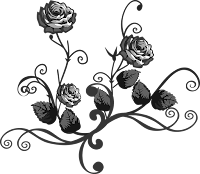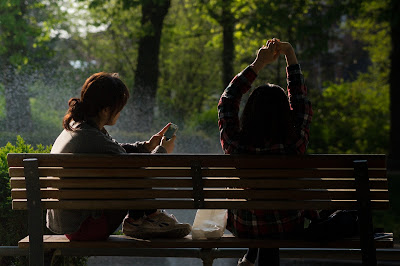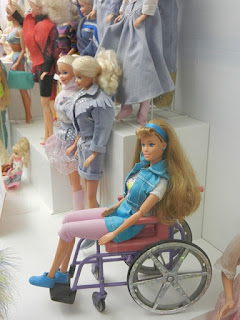(Flashing Images Warning: there are some gifs with flashing images in this blogpost which may cause problems for those with photosensitive conditions such as epilepsy or migraines.)
Let's kick off Disability Diaries 2017 with something a little different. Let's talk about scars.
(The lovely Ely @ Tea and Titles came up with the idea of Disability Diaries - a week long event running from 14th-21st Jan 2017, discussing disability, books, and disability in books.
Ely, myself, Angel @ Angel Reads, Dina @ Dinasoaur, Jolien @ The Fictional Reader, and Lara @ Another Teen Reader are running it.)
Scars. A physical sign of illness and injury. Not a disability, but often an indication of one, and often made into one by the way society treats them.
I have a lot of scars.
My scars are mundane - sorry, but there's no cool story of danger and adventure, neither is there any trauma you can romanticise.
But I'm covered in lines of silver, purple, and pink.
I scar easily - my skin is 'sensitive,' which is another way of saying 'my skin reacts to numerous substances and allergens, because my immune system treats them as a threat.' But that's not as pithy, I agree.
My skin also takes a long time to heal. So a simple scratch from my cat may leave a reddish purpleish line for 6 months or more.
So, with my variety of permanent, semi-permanent, and temporary scars, I notice the way we portray scars, in books and elsewhere.
Guess what? Society and media is cr*p at representation of scars. And for someone with low self-esteem (hello there! 🙋) it can have a really negative affect on how you view yourself.
Shall we take our most well-known scarred hero as an example?
(And I'd like to just point out that, like most people, I love Harry Potter and simply want to use this as an example to discuss scarring. It's really not an attack on anyone's enjoyment of anything.)
What do we know about Harry Potter's famous scar?
- it's lightning shaped
- it's the result of a magical curse that rebounded
- it's on his forehead
- it gives him magical Spidey-sense to let him know when Voldemort's faffing about
- it's permanent
And what does that tell us, my nerdlets, about the representation of scarring here?
His scar might be shaped like a lightning bolt, but it's a clean line.
Scars are often jagged, uneven, and/or unsightly.
Rowling falls into the trope of Good Scars vs Evil Scars - good scars, the kind heroes get, are either attractive or barely noticeable.
They are clean lines, as if made by a precision instrument, and healed evenly.
The villains get to have 'scary' jagged or unsightly scars, to show that they're evil inside and out (*sighs*.)
It's
a sign that he's 'the Chosen One' - it's derring-do and noble-suffering bound into one little line on his head.
And, just to be handy, it never dries out and flakes in the winter, forcing him to use non-heroic moisturiser.
Harry's scar is easily hidden.
Harry wears his hair long to hide his scar. While I would defend the right of anyone with a scar to either hide it, or display it, as they choose, why does Rowling choose to hide Harry's scar?
Is it, perhaps, because society sees facial imperfections and scars as something shameful, some sign of corruption?
By hiding his scar, he can hide his imperfection. Rowling's hero is flawed, but not where anyone can see it.
But guess what? Scars are ok. They are not a corruption, or a flaw of character. They are simply damaged skin.
OK, I'm about to blow your mind - SCARS DON'T HURT. Yes, yes, magic and all that. But scars have limited pain receptors.
Unless you cut through all the skin layers, they will very rarely actually hurt. The skin around them might ache or hurt, especially if they've dried out and tightened, but the scar itself? Not usually.
Scars are simply the result of collagen healing the skin. Yeah - collagen, that stuff they put in dermal fillers? Very few pain receptors.
And Harry's scar has magical Voldy Spider-sense.
Granted, this is handy plot-wise, and has the added 'oh, poor Harry!' effect that Rowling was clearly going for.
But what is this saying, really?
That scars are a constant reminder of the bad parts of your life and your past? That physical scars and psychological ones are directly linked?
That scars have to be (as Dumbledore says) 'useful' in order to be present on a hero instead of on a villain?
Scars actually change over time, you know that?
They can change vastly for about 2 years after the injury or other damage to the skin, and can change in appearance after that as your body ages.
You wouldn't think that, given that scars in so many books etc. are either healed completely within a week or two, or permanently in a specific state
for the rest of the character's life.
If your character ages, their scar should too.
Stretch marks in particular will silver as you get older (and no, stretch marks aren't just from pregnancies - they also occur in growth spurts, and sometimes around injuries where the skin has had to grow more quickly than normal in order to heal the wound.)
I have a small indented scar above my eye from where I had some face-time with a table aged six (it had staples sticking out of it, and accident-prone Cee over here just
had to connect with the stapled portion of the table.)
It looks different
all the freaking time. If I'm tired, it really stands out. Some days, it's barely there at all. Skin is stretchy and crinkly - especially on your face.
So, there I am as a kid, reading Harry Potter, and wondering why the hell his scar looks the same all the time? Why doesn't it flake? Why is it aching, but never pulling with skin tightness?
Facial skin moves a
lot, and you know those lines you get in your forehead when you're making expressions? They should've made Harry's scar look different
all the time.
Ms Rowling chose to give Harry a facial scar, yet doesn't seem to know what that entails.
I would've loved it if he wandered down to Madame Pomfrey every now and then in winter to ask for lotion of some kind.
Or maybe a description of the weird feeling of not-feeling when you move a joint or a muscle (like, in your forehead, for example) with a scar overlapping it?
Don't get me wrong, I have nothing against Harry, or against J K Rowling. It just would've been nice if, when writing a kid with a scar, she thought about what that was like.
Like this post? Try these:
















